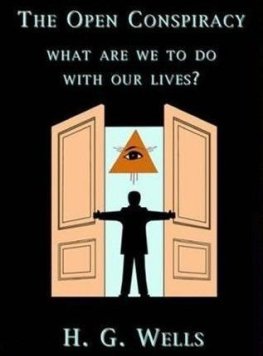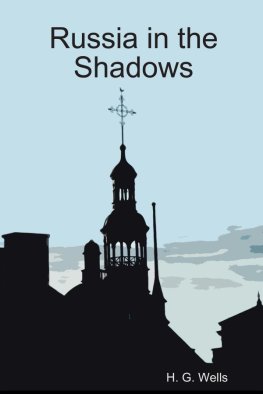Herbert Wells - Soul of a Bishop
Here you can read online Herbert Wells - Soul of a Bishop full text of the book (entire story) in english for free. Download pdf and epub, get meaning, cover and reviews about this ebook. genre: Prose. Description of the work, (preface) as well as reviews are available. Best literature library LitArk.com created for fans of good reading and offers a wide selection of genres:
Romance novel
Science fiction
Adventure
Detective
Science
History
Home and family
Prose
Art
Politics
Computer
Non-fiction
Religion
Business
Children
Humor
Choose a favorite category and find really read worthwhile books. Enjoy immersion in the world of imagination, feel the emotions of the characters or learn something new for yourself, make an fascinating discovery.

- Book:Soul of a Bishop
- Author:
- Genre:
- Rating:4 / 5
- Favourites:Add to favourites
- Your mark:
- 80
- 1
- 2
- 3
- 4
- 5
Soul of a Bishop: summary, description and annotation
We offer to read an annotation, description, summary or preface (depends on what the author of the book "Soul of a Bishop" wrote himself). If you haven't found the necessary information about the book — write in the comments, we will try to find it.
Soul of a Bishop — read online for free the complete book (whole text) full work
Below is the text of the book, divided by pages. System saving the place of the last page read, allows you to conveniently read the book "Soul of a Bishop" online for free, without having to search again every time where you left off. Put a bookmark, and you can go to the page where you finished reading at any time.
Font size:
Interval:
Bookmark:
THE SOUL OF A BISHOP
By H. G. Wells
CHAPTER THE FIRST
THE DREAM
(1)
IT was a scene of bitter disputation. A hawk-nosed young man with a pointing finger was prominent. His face worked violently, his lips moved very rapidly, but what he said was inaudible.
Behind him the little rufous man with the big eyes twitched at his robe and offered suggestions.
And behind these two clustered a great multitude of heated, excited, swarthy faces....
The emperor sat on his golden throne in the midst of the gathering, commanding silence by gestures, speaking inaudibly to them in a tongue the majority did not use, and then prevailing. They ceased their interruptions, and the old man, Arius, took up the debate. For a time all those impassioned faces were intent upon him; they listened as though they sought occasion, and suddenly as if by a preconcerted arrangement they were all thrusting their fingers into their ears and knitting their brows in assumed horror; some were crying aloud and making as if to fly. Some indeed tucked up their garments and fled. They spread out into a pattern. They were like the little monks who run from St. Jerome's lion in the picture by Carpaccio. Then one zealot rushed forward and smote the old man heavily upon the mouth....
The hall seemed to grow vaster and vaster, the disputing, infuriated figures multiplied to an innumerable assembly, they drove about like snowflakes in a gale, they whirled in argumentative couples, they spun in eddies of contradiction, they made extraordinary patterns, and then amidst the cloudy darkness of the unfathomable dome above them there appeared and increased a radiant triangle in which shone an eye. The eye and the triangle filled the heavens, sent out flickering rays, glowed to a blinding incandescence, seemed to be speaking words of thunder that were nevertheless inaudible. It was as if that thunder filled the heavens, it was as if it were nothing but the beating artery in the sleeper's ear. The attention strained to hear and comprehend, and on the very verge of comprehension snapped like a fiddle-string.
"Nicoea!"
The word remained like a little ash after a flare.
The sleeper had awakened and lay very still, oppressed by a sense of intellectual effort that had survived the dream in which it had arisen. Was it so that things had happened? The slumber-shadowed mind, moving obscurely, could not determine whether it was so or not. Had they indeed behaved in this manner when the great mystery was established? Who said they stopped their ears with their fingers and fled, shouting with horror? Shouting? Was it Eusebius or Athanasius? Or Sozomen.... Some letter or apology by Athanasius?... And surely it was impossible that the Trinity could have appeared visibly as a triangle and an eye. Above such an assembly.
That was mere dreaming, of course. Was it dreaming after Raphael? After Raphael? The drowsy mind wandered into a side issue. Was the picture that had suggested this dream the one in the Vatican where all the Fathers of the Church are shown disputing together? But there surely God and the Son themselves were painted with a symbolsome symbolalso? But was that disputation about the Trinity at all? Wasn't it rather about a chalice and a dove? Of course it was a chalice and a dove! Then where did one see the triangle and the eye? And men disputing? Some such picture there was....
What a lot of disputing there had been! What endless disputing! Which had gone on. Until last night. When this very disagreeable young man with the hawk nose and the pointing finger had tackled one when one was sorely fagged, and disputed; disputed. Rebuked and disputed. "Answer me this," he had said.... And still one's poor brains disputed and would not rest.... About the Trinity....
The brain upon the pillow was now wearily awake. It was at once hopelessly awake and active and hopelessly unprogressive. It was like some floating stick that had got caught in an eddy in a river, going round and round and round. And round. Eternallyeternallyeternally begotten.
"But what possible meaning do you attach then to such a phrase as eternally begotten?"
The brain upon the pillow stared hopelessly at this question, without an answer, without an escape. The three repetitions spun round and round, became a swiftly revolving triangle, like some electric sign that had got beyond control, in the midst of which stared an unwinking and resentful eye.
(2)
Every one knows that expedient of the sleepless, the counting of sheep.
You lie quite still, you breathe regularly, you imagine sheep jumping over a gate, one after another, you count them quietly and slowly until you count yourself off through a fading string of phantom numbers to number Nod....
But sheep, alas! suggest an episcopal crook.
And presently a black sheep had got into the succession and was struggling violently with the crook about its leg, a hawk-nosed black sheep full of reproof, with disordered hair and a pointing finger. A young man with a most disagreeable voice.
At which the other sheep took heart and, deserting the numbered succession, came and sat about the fire in a big drawing-room and argued also. In particular there was Lady Sunderbund, a pretty fragile tall woman in the corner, richly jewelled, who sat with her pretty eyes watching and her lips compressed. What had she thought of it? She had said very little.
It is an unusual thing for a mixed gathering of this sort to argue about the Trinity. Simply because a tired bishop had fallen into their party. It was not fair to him to pretend that the atmosphere was a liberal and inquiring one, when the young man who had sat still and dormant by the table was in reality a keen and bitter Irish Roman Catholic. Then the question, a question-begging question, was put quite suddenly, without preparation or prelude, by surprise. "Why, Bishop, was the Spermaticos Logos identified with the Second and not the Third Person of the Trinity?"
It was indiscreet, it was silly, to turn upon the speaker and affect an air of disengagement and modernity and to say: "Ah, that indeed is the unfortunate aspect of the whole affair."
Whereupon the fierce young man had exploded with: "To that, is it, that you Anglicans have come?"
The whole gathering had given itself up to the disputation, Lady Sunderbund, an actress, a dancerthough she, it is true, did not say very mucha novelist, a mechanical expert of some sort, a railway peer, geniuses, hairy and Celtic, people of no clearly definable position, but all quite unequal to the task of maintaining that air of reverent vagueness, that tenderness of touch, which is by all Anglican standards imperative in so deep, so mysterious, and, nowadays, in mixed society at least, so infrequent a discussion.
It was like animals breaking down a fence about some sacred spot. Within a couple of minutes the affair had become highly improper. They had raised their voices, they had spoken with the utmost familiarity of almost unspeakable things. There had been even attempts at epigram. Athanasian epigrams. Bent the novelist had doubted if originally there had been a Third Person in the Trinity at all. He suggested a reaction from a too-Manichaean dualism at some date after the time of St. John's Gospel. He maintained obstinately that that Gospel was dualistic.
The unpleasant quality of the talk was far more manifest in the retrospect than it had been at the time. It had seemed then bold and strange, but not impossible; now in the cold darkness it seemed sacrilegious. And the bishop's share, which was indeed only the weak yielding of a tired man to an atmosphere he had misjudged, became a disgraceful display of levity and bad faith. They had baited him. Some one had said that nowadays every one was an Arian, knowingly or unknowingly. They had not concealed their conviction that the bishop did not really believe in the Creeds he uttered.
Font size:
Interval:
Bookmark:
Similar books «Soul of a Bishop»
Look at similar books to Soul of a Bishop. We have selected literature similar in name and meaning in the hope of providing readers with more options to find new, interesting, not yet read works.
Discussion, reviews of the book Soul of a Bishop and just readers' own opinions. Leave your comments, write what you think about the work, its meaning or the main characters. Specify what exactly you liked and what you didn't like, and why you think so.


